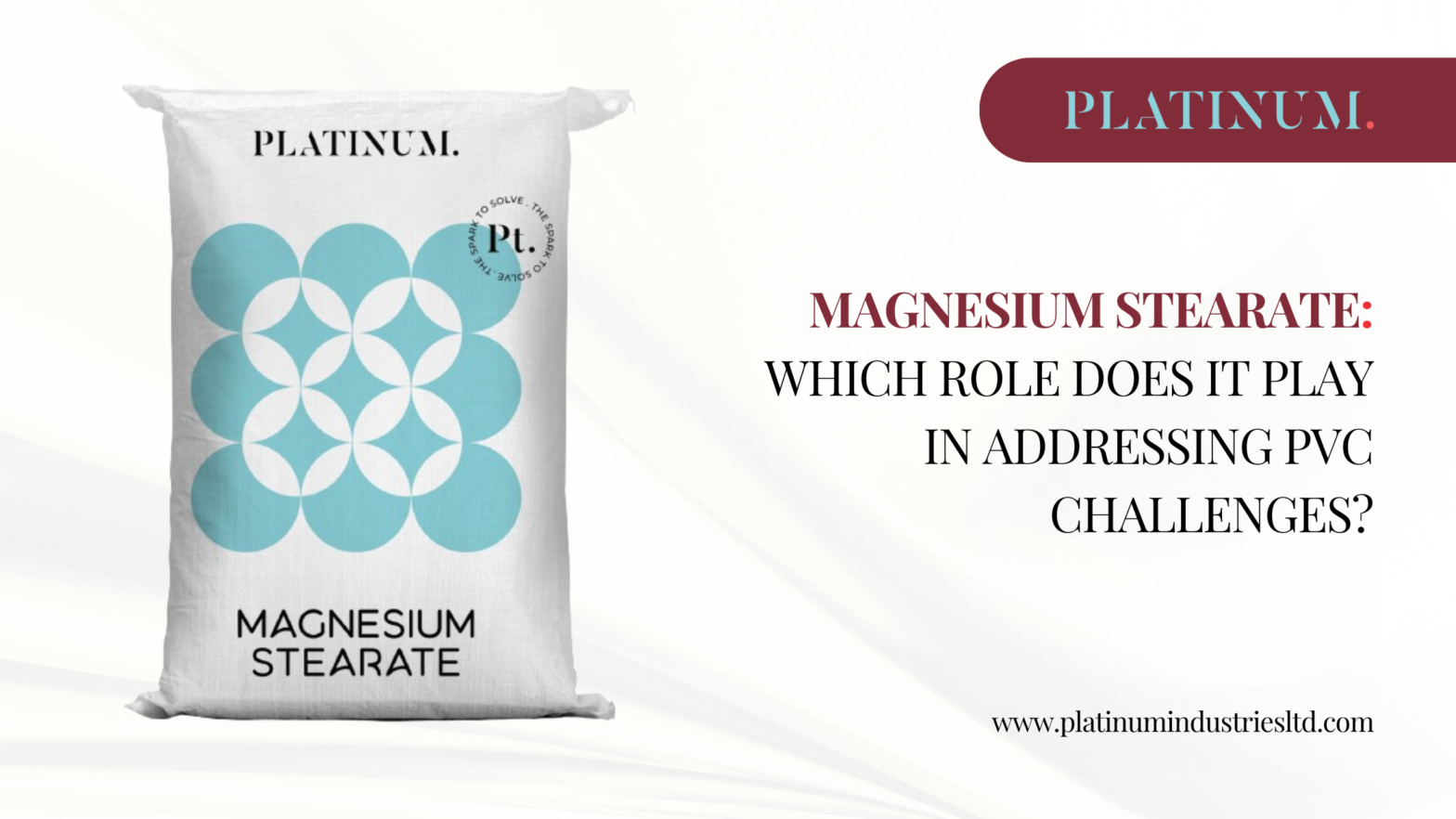In the range of industrial metal soaps and lubricants, there are multiple options for manufacturers to choose from. However, given the extensive experience of Platinum Industries Ltd. within the area of these, what stands out as a light house of performance and versatility among lubricants is Magnesium stearate.
Let’s dive into the magic of Magnesium stearate in Polyvinyl chloride (PVC)and other applications applications:
1. Understanding Magnesium Stearate:
What is meant by Magnesium stearate? – As a chemist, Magnesium stearate refers to the Magnesium salt derived from pure stearic acid, which consists of 18 carbon atoms. This holds true even for individuals lacking a chemical background. However, this description is not entirely accurate. Why? – The discrepancy lies in the definition of stearic acid. Technically, ‘stearic acid’ is sourced from renewable raw materials, such as fats and oils, notably palm oil and tallow oil, from which ‘stearic acid’ is derived. Depending on their source, these raw materials exhibit varying compositions of different fatty acids. Among them, stearic acid with 18 carbon atoms (C18) is predominant, alongside palmitic acid (C16) and, to a lesser extent, myristic acid (C14). For users, the chemically precise term would be the Magnesium salt of the C16-18 fatty acids. They even have different CAS numbers.
Pure Magnesium stearate or Stearic acid Magnesium salt:
CAS Number: 557-04-0
Molecular weight: 591.2 g/mol
Formula: C36H70O4Mg
Technical Magnesium stearate or C16-18 Fatty acid Magnesium salt:
CAS Number: 91031-63-9
Molecular weight: not defined
Formula: not defined
2. Production and Properties:
Magnesium stearate can be produced by several methods:
- by a precipitation process in water
- by a melt process by reacting Magnesium (hydr)oxide with melted stearic acid at 120 to 130°C
- by fusion process by reacting Magnesium (hydr)oxide with stearic acid at ambient temperatures
Depending on the amount and quality on stearic acid and Magnesium component different a range of physical-chemical properties can be reached.
3. Heat Stability and Thermal Resistance:
One of the key advantages of Magnesium stearates is their remarkable heat stability and thermal resistance. Even at high temperatures, Magnesium stearates maintain their colour without decomposing or degrading, ensuring consistent performance in demanding industrial environments.
4. Application:
Magnesium stearate is a widely used substance in the plastic, pharmaceutical, cosmetic, and food industries. Here are some uses:
- Pharmaceutical Industry: Magnesium stearate is commonly used as a lubricant to facilitate tablet manufacturing. It helps reduce friction between the tablets and the molds, thus facilitating the manufacturing process.
- Cosmetic Industry: In cosmetics, magnesium stearate is often used as a thickening agent, anti-caking agent, and texturizing component in various products such as creams, lotions, powders, and makeup.
- Food Industry: In the food industry, magnesium stearate is used as an anti-caking agent to prevent powders from clumping together. It is often found in spices, chewing gum, confectionery, and dietary supplements.
| Grade | Application | %Mg | %FFA | Mp/°C | Loss on dry (105⁰C/ 60 min) | Bulk density (tapped, g/l |
| Magnesium stearate – SM | As an acid scavenger in the processing of polymers , as an internal lubricant in Polymers processing and automotive compounding. | 4.0 – 5.0 | <1.0 | 115-135 | <3.0 | 250-350 |
5. Magnesium Stearate in PVC:
Magnesium stearate serves various functions in PVC applications. Primarily, it acts as an acid scavenger and as an external lubricant. It has a double function as a stabiliser:
- it takes over the Chloride ions from Zinc chloride which promotes the decomposition of PVC
- it acts directely as a acid scavenger by neutralising the HCl (Hydrochloric acid) which is formed while processing of PVC
Predominantly utilized in Calcium-Zinc and Clacium-organic stabilisers, Magnesium stearate can also be combined with Tin and Lead stabilisers. However, every silver lining has a cloud. An overdosing of Magnesium stearate in PVC and esp. in rigid applications might result in plate out in the hot areas of an extrusion line.
6. Keywords:
#PVC #stabiliser #stabilizer #metal soaps #metallic soaps
As indispensable additives in PVC formulations, Magnesium stearates contribute to the stability, processability, and performance of PVC products.
To know more about purchasing high-grade Magnesium stearates, we can assist you. Being a member of the Indian Vinyl Council, Platinum Industries Ltd. is among the leading manufacturers of stearates that exceed industry standards.
Platinum Industries Ltd., a member of Indian Vinyl Council (IVC)

